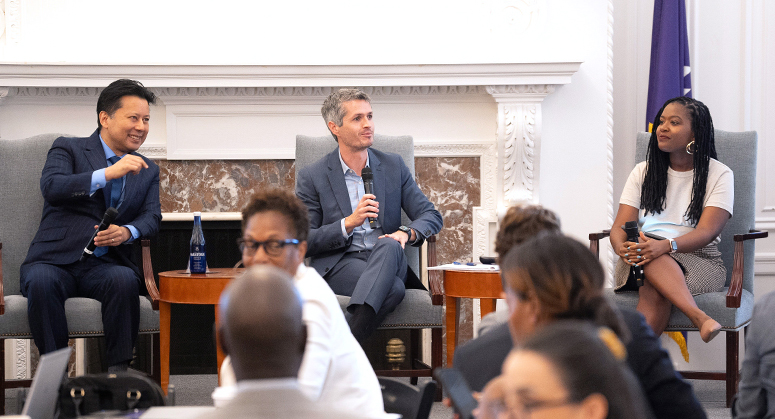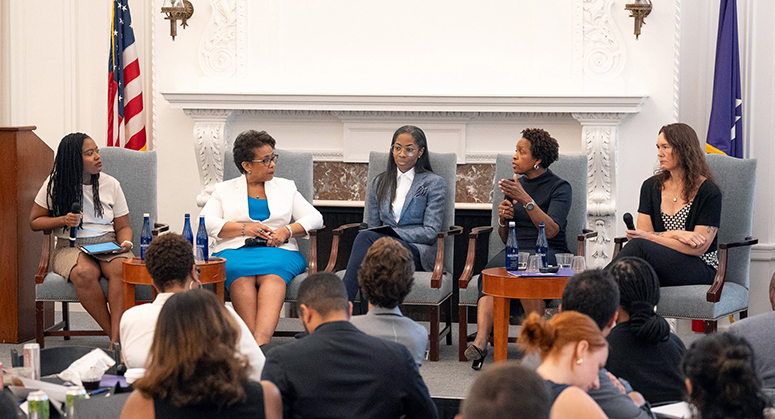Former US attorney general Loretta Lynch and other experts grapple with the future of diversity, equity, and inclusion initiatives
Loretta Lynch, former US attorney general in the Obama administration, was among some 200 professionals in academia, government, business, and the public interest sector who convened at NYU Law on July 12 for “Diversity Forward: Strengthening DEI in a Time of Backlash,” a forum focused on the complicated future of diversity, equity, and inclusion (DEI) initiatives in the workplace. The all-day event, joined by roughly 150 online viewers in addition to the in-person attendees, was hosted by the Law School’s Meltzer Center for Diversity, Inclusion, and Belonging.
DEI has faced increasing cultural, political, and legal backlash in recent years, culminating in the Supreme Court opinion last year in Students for Fair Admissions v. Harvard that struck down race-based affirmative action programs in college admissions. The potential implications of the ruling have created widespread uncertainty about DEI programs in both higher education and other realms in which affirmative action plays a part.
The day began with a discussion of the state of the law a year after the Supreme Court ruling by a panel that included Kenji Yoshino, Chief Justice Earl Warren Professor of Constitutional Law and faculty director of the Meltzer Center; David Glasgow LLM ’14, the center’s executive director; and Christina Joseph, project director of the center’s Advancing DEI Initiative, which was unveiled during the discussion. A key component of the new initiative is an online DEI litigation tracker to help practitioners monitor recent anti-DEI lawsuits.
The forum’s marquee event, a panel titled “Breaking Down Silos,” featured Lynch, now chair of Paul, Weiss, Rifkind, Wharton & Garrison’s Civil Rights and Racial Equity Audits Practice, alongside other DEI experts. Lynch laid out the current political and legal environment surrounding DEI using three adjectives: “fraught,” “fluid,” and “focused.” While reactionary forces have gained momentum, she said, so has the population supporting DEI.
“If anything, this current backlash has energized and invigorated a generation of civil rights leaders and DEI leaders in ways that we really have not seen since [the civil rights] days of the ’60s,” said Lynch. “And while we are sitting through this challenging time, to use an understatement, it’s important to remember that we actually have so many more tools than we did 40 or 50 years ago.” Those tools, she added, include statutes, case law, and determined people who aren’t inclined to go backward on civil rights.
One challenge, Lynch mentioned, is a series of “in terrorem [legal threat] campaigns” in which conservative state attorneys general have sent letters to Fortune 500 corporations challenging their DEI programs and warning them against “discriminating…through DEI.”
Lanaya Irvin, CEO of Coqual, a nonprofit think tank and advisory group that focuses on bias and barriers to advancement in the workplace for underrepresented populations, said that her experience of interacting with more than 100 large multinationals through her organization has shown that most of them are staying the course on DEI.
“There’s been a tie to institutional fabric for many of them,” said Irvin. “It’s not just their people. It’s their brand campaigns, their product development, their clinical trials. There’s no unwinding this, because it’s become a part of the way that they think about how they come to market and deliver for their stakeholders…. It’s not necessarily a moving away from; it’s really thinking about how do we partner with legal internally, assess the risk that we have, and continue the journey?”
Susan Reid, Morgan Stanley’s global head of talent, suggested that virtually any multinational would already have ensured that their DEI initiatives were on sound legal footing, and that Students for Fair Admissions and other developments provide an opportunity to double-check previous assessments.
“I think the thing that we have to be careful about,” said Reid, “is that the current moment actually doesn’t trick our brain into thinking that we’re doing bad things…. The narrative that’s being built up in the media and through the challenges that we’re getting and the language that’s being put out suggests that the work that we’re doing is bad and harmful, and so we all have to take a step back as professionals and as subject matter experts and recognize that we’ve been doing this work in a very thoughtful way.”
At LinkedIn, said Jaimi Kerr, the company’s senior director of global employment law, the Supreme Court ruling prompted her and her colleagues to reexamine the fundamentals of their DEI program, as Reid did at Morgan Stanley. “We look at a lot of data. We look at a lot of numbers. But also this is about the culture of our organization,” Kerr said. Even a well-designed program can risk turning into another box to be checked, she added. It’s important, she said, to keep in mind the question: “What is the meaning of the program to begin with? What are we doing to make this a long-term, sustainable, meaningful, and effective program?”
Lynch encouraged DEI proponents to take the long view. “We have not always had a friend in the White House in many iterations, politically, in this country,” she said. “And yet the work has continued, the commitment has not wavered, people have not flagged.”
“Depending upon what federal circuit you live in, depending upon what state you live in, one could arguably say you are already in a second Trump administration…. So we actually have a preview,” Lynch added. “And while I think the reactionary forces view that as a victory, we should view it as an opportunity, because now we have your playbook. Now we see where you’re headed, and so we can craft strategies to push back on that.”
Photos from the event:
Posted August 26, 2024



